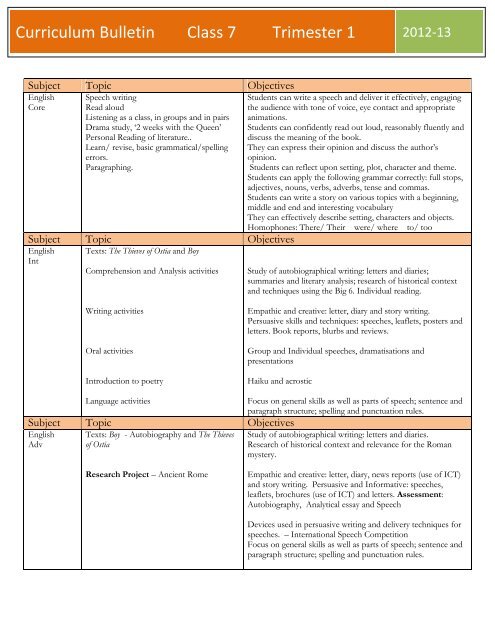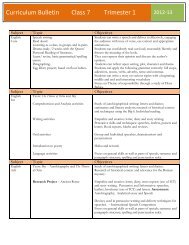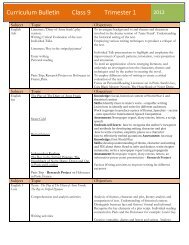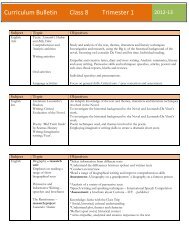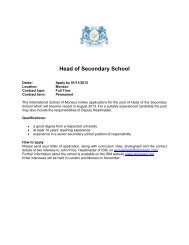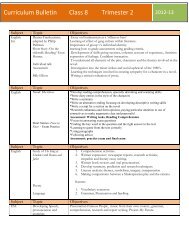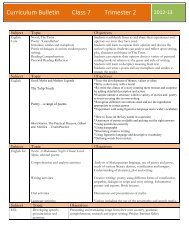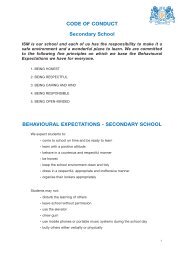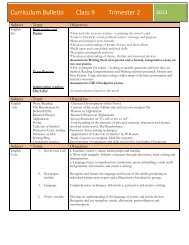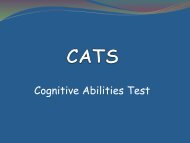Curriculum Bulletin Class 7 Trimester 1 - The International School of ...
Curriculum Bulletin Class 7 Trimester 1 - The International School of ...
Curriculum Bulletin Class 7 Trimester 1 - The International School of ...
You also want an ePaper? Increase the reach of your titles
YUMPU automatically turns print PDFs into web optimized ePapers that Google loves.
<strong>Curriculum</strong> <strong>Bulletin</strong> <strong>Class</strong> 7 <strong>Trimester</strong> 1 2012-13<br />
Subject Topic Objectives<br />
English<br />
Core<br />
Speech writing<br />
Read aloud<br />
Listening as a class, in groups and in pairs<br />
Drama study, ‘2 weeks with the Queen’<br />
Personal Reading <strong>of</strong> literature..<br />
Learn/ revise, basic grammatical/spelling<br />
errors.<br />
Paragraphing.<br />
Subject Topic Objectives<br />
English<br />
Int<br />
Texts: <strong>The</strong> Thieves <strong>of</strong> Ostia and Boy<br />
Comprehension and Analysis activities<br />
Students can write a speech and deliver it effectively, engaging<br />
the audience with tone <strong>of</strong> voice, eye contact and appropriate<br />
animations.<br />
Students can confidently read out loud, reasonably fluently and<br />
discuss the meaning <strong>of</strong> the book.<br />
<strong>The</strong>y can express their opinion and discuss the author’s<br />
opinion.<br />
Students can reflect upon setting, plot, character and theme.<br />
Students can apply the following grammar correctly: full stops,<br />
adjectives, nouns, verbs, adverbs, tense and commas.<br />
Students can write a story on various topics with a beginning,<br />
middle and end and interesting vocabulary<br />
<strong>The</strong>y can effectively describe setting, characters and objects.<br />
Homophones: <strong>The</strong>re/ <strong>The</strong>ir were/ where to/ too<br />
Study <strong>of</strong> autobiographical writing: letters and diaries;<br />
summaries and literary analysis; research <strong>of</strong> historical context<br />
and techniques using the Big 6. Individual reading.<br />
Writing activities<br />
Oral activities<br />
Introduction to poetry<br />
Empathic and creative: letter, diary and story writing.<br />
Persuasive skills and techniques: speeches, leaflets, posters and<br />
letters. Book reports, blurbs and reviews.<br />
Group and Individual speeches, dramatisations and<br />
presentations<br />
Haiku and acrostic<br />
Language activities<br />
Subject Topic Objectives<br />
English<br />
Adv<br />
Texts: Boy - Autobiography and <strong>The</strong> Thieves<br />
<strong>of</strong> Ostia<br />
Research Project – Ancient Rome<br />
Focus on general skills as well as parts <strong>of</strong> speech; sentence and<br />
paragraph structure; spelling and punctuation rules.<br />
Study <strong>of</strong> autobiographical writing: letters and diaries.<br />
Research <strong>of</strong> historical context and relevance for the Roman<br />
mystery.<br />
Study <strong>of</strong> autobiographical writing: letters and diaries. Devices used in<br />
Empathic and creative: letter, diary, news reports (use <strong>of</strong> ICT)<br />
and story writing. Persuasive and Informative: speeches,<br />
leaflets, brochures (use <strong>of</strong> ICT) and letters. Assessment:<br />
Autobiography, Empathic and Analytical creative: letter essay and diary Speech writing. Persuasive skills and<br />
Devices used in persuasive writing and delivery techniques for<br />
speeches. – <strong>International</strong> Speech Competition<br />
Focus on general skills as well as parts <strong>of</strong> speech; sentence and<br />
paragraph structure; spelling and punctuation rules.
<strong>Curriculum</strong> <strong>Bulletin</strong> <strong>Class</strong> 7 <strong>Trimester</strong> 1 2012-13<br />
Subject Topic Objectives<br />
Music<br />
An introduction to<br />
<strong>Class</strong>ical Music<br />
Learning how to notate music on the treble clef<br />
Recognising instruments <strong>of</strong> the orchestra<br />
Comparing traditional and modern recordings <strong>of</strong> classical music<br />
Learning about classical composers<br />
Playing piano, 2 hands together<br />
*Assessment will be through listening and performing during this trimester<br />
Subject Topic Objectives<br />
Art<br />
How and Why Do We<br />
Create?<br />
Understanding how and why human beings create. Knowing how to use the<br />
creative process and how this process applies to all areas <strong>of</strong> life. Introduction to<br />
the Investigation Workbook.<br />
<strong>The</strong> Elements and<br />
Principles <strong>of</strong> Art: What<br />
did the Romans Teach<br />
Us?<br />
Exploring the Elements and Principles <strong>of</strong> Art through a design project based on<br />
contemporary Mosaics. Comparisons will be made between modern artists such<br />
as Niki de Saint Phalle and the Romans.<br />
Subject Topic Objectives<br />
Drama<br />
Drama is serious fun.<br />
Students will address the<br />
following questions:<br />
What is Drama? What<br />
skills will help me in<br />
drama? What can we<br />
learn from drama?<br />
<strong>The</strong>y will learn that<br />
imagination and<br />
conviction heighten the<br />
experience <strong>of</strong> making<br />
drama.<br />
Students will know:<br />
what is meant by "Drama is serious fun"<br />
that a "willingness to engage" is more important than 'talent'<br />
understand what is meant by 'a safe environment' in this context.<br />
some <strong>of</strong> the basic individual and group skills essential for successful<br />
drama including listening, focusing, effort, respect, feedback, supporting<br />
the group<br />
Students will be able to:<br />
sustain concentration<br />
work co operatively outside friendship groups<br />
work individually<br />
work in small groups<br />
follow a series <strong>of</strong> instructions<br />
translate instructions into action<br />
work with a sense <strong>of</strong> common purpose<br />
work with sensitivity to the needs <strong>of</strong> others<br />
begin to overcome physical inhibitions and reserve<br />
to reflect on individual strengths and weaknesses and to give constructive<br />
feedback
<strong>Curriculum</strong> <strong>Bulletin</strong> <strong>Class</strong> 7 <strong>Trimester</strong> 1 2012-13<br />
demonstrate the skills identified<br />
Subject Topic Objectives<br />
Science<br />
1)Cells<br />
Describe the properties <strong>of</strong> plant and animal cells.<br />
Describe the position and function <strong>of</strong> major human organs and organ parts.<br />
Use microscopes to look at cells.<br />
Describe the main features <strong>of</strong> plants and how plants reproduce.<br />
2) Chemical Reactions<br />
3) Energy Resources<br />
Trip to Nimes<br />
Recognise and describe chemical reactions.<br />
Distinguish between physical and chemical changes.<br />
Use the words reactants, products, oxides and fuels correctly.<br />
Perform the limewater test.<br />
Understand fires and safety issues related to them.<br />
Understand the importance <strong>of</strong> our energy supply and some <strong>of</strong> the issues<br />
surrounding it.<br />
Use the terms fossil fuel, renewable and non-renewable fuel correctly<br />
Describe and evaluate other energy resources.<br />
Be aware that chemical energy is stored in food<br />
Research how bridges were built in terms <strong>of</strong> forces – Pond du Gard<br />
Subject Topic Objectives<br />
Writing<br />
Process<br />
Reading comprehension:<br />
factual and fictional<br />
Writing for different<br />
purposes<br />
Comprehension texts and exercises. Projects: Sport and the Olympic Games,<br />
Planets fact files, short stories based on Mythology. Spelling, Punctuation and<br />
Grammar reinforcement.<br />
Subject Topic Objectives<br />
I.C.T Magazines To write, illustrate and publish a magazine for the middle school community<br />
To include:<br />
- To select information for a task from a range <strong>of</strong> sources and be aware <strong>of</strong><br />
the relative strengths and weaknesses <strong>of</strong> these sources<br />
- To acknowledge sources and recognize copyright<br />
- To recognise the common layouts and conventions used in different<br />
types <strong>of</strong> communication and how these address intended and familiar<br />
audience needs<br />
Subject Topic Objectives<br />
Maths<br />
Extended and<br />
Maths Core<br />
Whole numbers and<br />
decimals<br />
Coordinates<br />
Whole number, squares, cubes, square roots, factors and primes, negative<br />
integers, decimals, rounding, significant figures, scientific notation, the 4<br />
operations and their vocabulary<br />
Coordinates in 4 quadrants
<strong>Curriculum</strong> <strong>Bulletin</strong> <strong>Class</strong> 7 <strong>Trimester</strong> 1 2012-13<br />
Ratio and proportion<br />
Fractions and<br />
Percentages<br />
Ratios, unitary ratios, direct and inverse proportion<br />
Calculating and using percentages, equivalent fractions and mixed numbers, the 4<br />
operations with fractions<br />
Subject Topic Objectives<br />
Social Studies Roman Empire To understand how Rome developed as an Empire<br />
To understand the influence <strong>of</strong> the Roman Empire<br />
To understand how Rome maintained control <strong>of</strong> its Empire<br />
To understand key Historical figures<br />
To understand what the Romans did for us<br />
Subject Topic Objectives<br />
Physical<br />
Education<br />
Cycle 1: Beach volley<br />
Cycle 2: Wrestling<br />
C1: to play as a team and use physical, technical and tactical skills learned during<br />
the cycle.<br />
C2: to enter in a fight, respecting the rules and not putting the opponent in<br />
danger, using the techniques learned during the cycle.<br />
Subject Topic Objectives<br />
DT Typography & Print To create and film a stop-motion animation<br />
To include:<br />
- To evaluate which hand and machine tools, equipment and computeraided<br />
design/manufacture (CAD/CAM) facilities are the most<br />
appropriate to use<br />
- To explore the impact <strong>of</strong> ideas, design decisions and technological<br />
advances and how these provide opportunities for new design solutions<br />
- To work with designers and makers where possible to develop an<br />
understanding <strong>of</strong> the product design process<br />
Subject Topic Objectives<br />
Spanish<br />
Mi familia y mis<br />
amigos: alphabet,<br />
numbers, days <strong>of</strong> the<br />
week. Questions and<br />
negatives.<br />
Mi colegio y mi casa:<br />
school subjects,<br />
timetable. <strong>The</strong> time.<br />
<strong>The</strong> numbers 1-199.<br />
How to use informal and formal greetings.<br />
How to say the date: months, dates, days <strong>of</strong> the week.<br />
How to build questions and negatives.<br />
Writing basic information about themselves and their families.<br />
How to tell and ask the time. Timetables.<br />
How to express likes and dislikes.
<strong>Curriculum</strong> <strong>Bulletin</strong> <strong>Class</strong> 7 <strong>Trimester</strong> 1 2012-13<br />
Likes and dislikes.<br />
Subject Topic Objectives<br />
Russian<br />
Русская народная сказка;<br />
«Иван-царевич и серый<br />
волк».<br />
Авторская сказка;<br />
А.С.Пушкин. «Сказка о<br />
мёртвой царевне и о<br />
семи богатырях».<br />
В. Астафьев «Васюткино<br />
озеро»<br />
Основные орфограммы.<br />
Словосочетание<br />
Знакомство с географией<br />
России.<br />
Arles et Nîmes trip<br />
Subject Topic Objectives<br />
Italian<br />
La favola<br />
La fiaba<br />
Определить жанр произведения, уметь говорить о сказках.<br />
Читать и понимать поэтический текст.<br />
Отвечать на вопросы по тексту.<br />
Составить план сочинения.<br />
Творческие работы – описание героя,<br />
сочинение сказки.<br />
“Romans” vocabulary in Russian<br />
Leggere ed analizzare i testi narrativi più semplici: la favola e la fiaba.<br />
Inventare una favola, una fiaba. Descrivere oggetti, animali, ambienti.<br />
Il racconto fantastico<br />
Lo schema narrativo<br />
Il ruolo dei personaggi<br />
I luoghi e i tempi<br />
Storia d’Italia: gli Etruschi, la<br />
Magna Graecia.<br />
Geografia d’Italia.<br />
Narrare esperienze personali.<br />
Riconoscere la struttura narrativa di un testo. Progettare e scrivere un testo.<br />
Saper distinguere i personaggi in base al loro ruolo nella storia.<br />
Saper raccontare un episodio vissuto da protagonista o di cui si è stati<br />
testimoni (raccontare un’esperienza interessante durante la gita scolastica a<br />
Carcassonne).<br />
Conoscere l’Italia preromana.<br />
Conoscere i vari tipi di paesaggio presenti in Italia: la montagna, la pianura, la<br />
collina, i laghi, le coste.
<strong>Curriculum</strong> <strong>Bulletin</strong> <strong>Class</strong> 7 <strong>Trimester</strong> 1 2012-13<br />
Subject Topic Objectives<br />
German<br />
Literatur:<br />
Fabeln, Sagen,<br />
Märchen<br />
- Definition von Fabel, Sage, Märchen<br />
- Textsortenspezifische Merkmale erkennen<br />
- Verschiedene Fabeln, Sagen und Märchen lesen und verstehen<br />
Schreiben:<br />
- Verfassen von eigenen Texten (Fabeln, Sagen, Märchen)<br />
Grammatik:<br />
Die Wortarten (Nomen,<br />
Artikel, Pronomen,<br />
Adjektive)<br />
- Deklination von Nomen<br />
- Der Unterschied zwischen bestimmtem und unbestimmtem Artikel<br />
- Die Funktion von Pronomen im Satz<br />
- Verwendung und Steigerung von Adjektiven
<strong>Curriculum</strong> <strong>Bulletin</strong> <strong>Class</strong> 7 <strong>Trimester</strong> 1 2012-13<br />
Subject Topic Objectives<br />
French (Beg) Encore Tricolore 1<br />
Chapitres 1à 4.<br />
Ch.1-Bonjour<br />
Ch 1) Introducing oneself, giving /asking name and age, numbers up to 20,<br />
introduction <strong>of</strong> masculine and feminine, introduction to verbs être and avoir, basic<br />
questions, simple conversation , classroom object ,repeat and differentiate French<br />
sounds<br />
Subject<br />
French (Int)<br />
Ch. 2-J`habite ici<br />
Ch. 3-Chez moi<br />
Ch.4- Les animaux<br />
Ch. 1 Communiquer<br />
Ch. 2 Découvrir les mots<br />
Ch. 3 Donner un nom<br />
Le présent<br />
l’accord sujet/verbe,<br />
les verbes expressifs,<br />
les synonymes et les<br />
contraires.<br />
L’accord des adjectifs.<br />
Ch 2) Say/ask about where you live, discover a French town, talk about<br />
countries/nationalities, use numbers up to 30 , introduction to the plural form <strong>of</strong><br />
nouns, listening comprehension activities, verbs être and avoir , adjectives<br />
Ch 3) Talk/write about family and home, locating objects, speak/ recognize/spell<br />
days <strong>of</strong> the week, say the date in different ways ,use numbers up to 69, use “le, la,<br />
les, un, une, des” , ask/answer questions, use “mon, ma, mes, ton, ta, tes », continue to<br />
use verbes « être et avoir », listening comprehension activities,<br />
Ch 4) Talk/write about pets and animals, express likes and dislikes, learn French<br />
alphabet, spell words aloud using French alphabet, write/ask questions with “est-ce<br />
que”<br />
Bien comprendre les consignes. /Que dit le tableau ?<br />
Jeux de mots. / Les mots et l’image<br />
Nommer les lieux, les personnages, les choses<br />
Ecrire des textes simples au présent en respectant les accords.<br />
Utiliser un dictionnaire pour trouver le sens des mots<br />
Décrire une image de façon précise avec des verbes expressifs<br />
Présentation sur des villes Ecrire un texte documentaire sur une ville.<br />
d’Arles et d’Avignon<br />
Subject Topic Objectives<br />
French (Adv)<br />
Les jeunes au cœur de la<br />
communication<br />
Tradition et modernité<br />
des contes merveilleux<br />
Les contes merveilleux<br />
(lecture dirigée)<br />
Les contes du pourquoi<br />
et du comment<br />
Orthographe, grammaire,<br />
conjugaison<br />
Lire/définir la situation de communication. Comprendre un texte écrit et la<br />
nécessité de respecter un code.<br />
Ecrire/ Prendre en compte le destinataire. Distinguer les registres de la langue.<br />
Oral/ Savoir utiliser le niveau de langue approprié et utiliser les éléments de la<br />
présentation orale : diction, intonation…<br />
Lire/ Comprendre et connaitre ce genre littéraire.<br />
Ecrire/Ecrire un conte à partir de la situation initiale. Ecrire une comparaison<br />
entre le film et le livre « Cendrillon ».<br />
Oral / Débats<br />
Comprendre le sens des contes. Répondre aux questions sur le contenu, les<br />
personnages…Différencier le bien et le mal, trouver la morale.<br />
Lire/Différencier et comprendre le texte explicatif et le texte narratif. Distinguer<br />
les niveaux de sens.<br />
Ecrire/Exprimer une attente de lecteur. Ecrire un conte pour expliquer un<br />
phénomène naturel.<br />
Oral/Présenter oralement une lecture.<br />
Orthographe grammaticale, ou/où…Accords sujet/ verbe ;<br />
nom/adjectif…Présent des 3 groupes, futur et imparfait
<strong>Curriculum</strong> <strong>Bulletin</strong> <strong>Class</strong> 7 <strong>Trimester</strong> 1 2012-13<br />
Projet/Voyage/L’impact des<br />
Romains sur notre<br />
civilisation.<br />
Livre :L’affaire Caïllus + Big 6’’ project’’sur l’Impact des Romains sur notre Civilisaton


